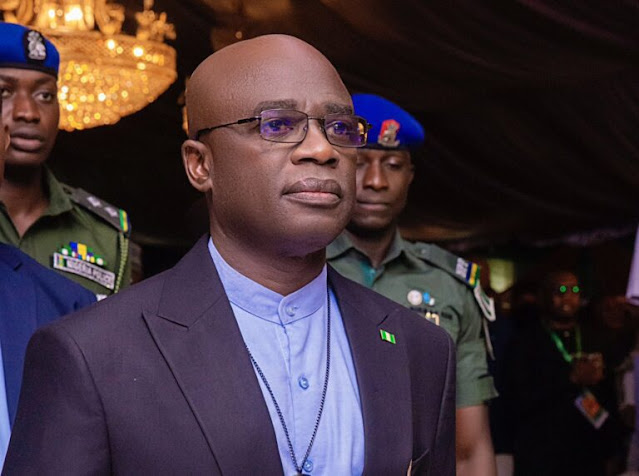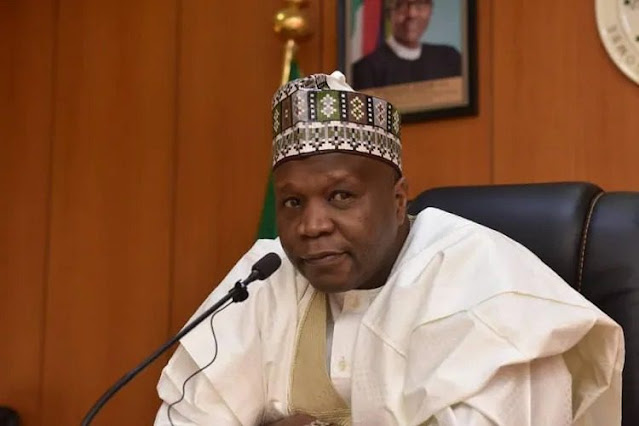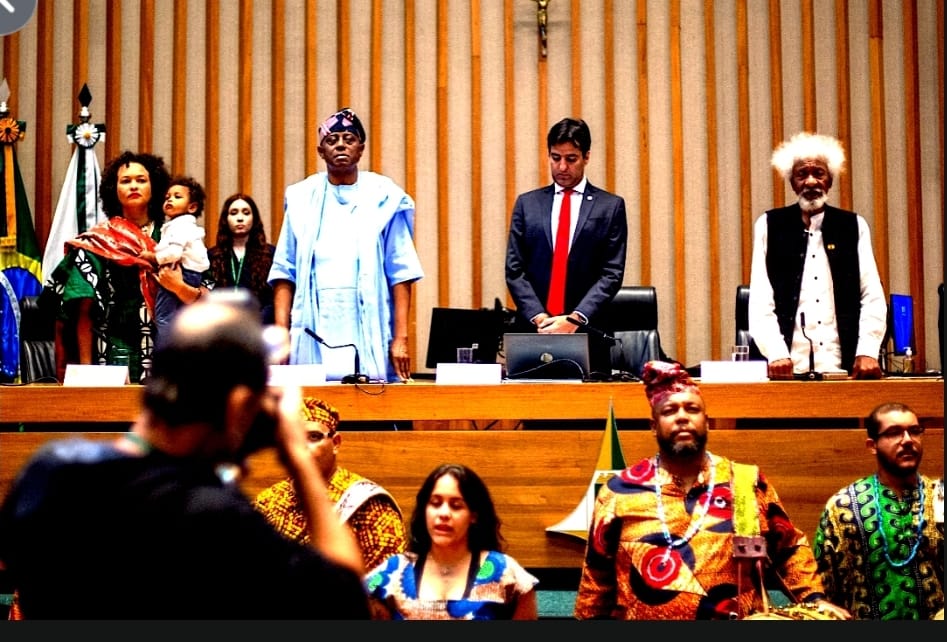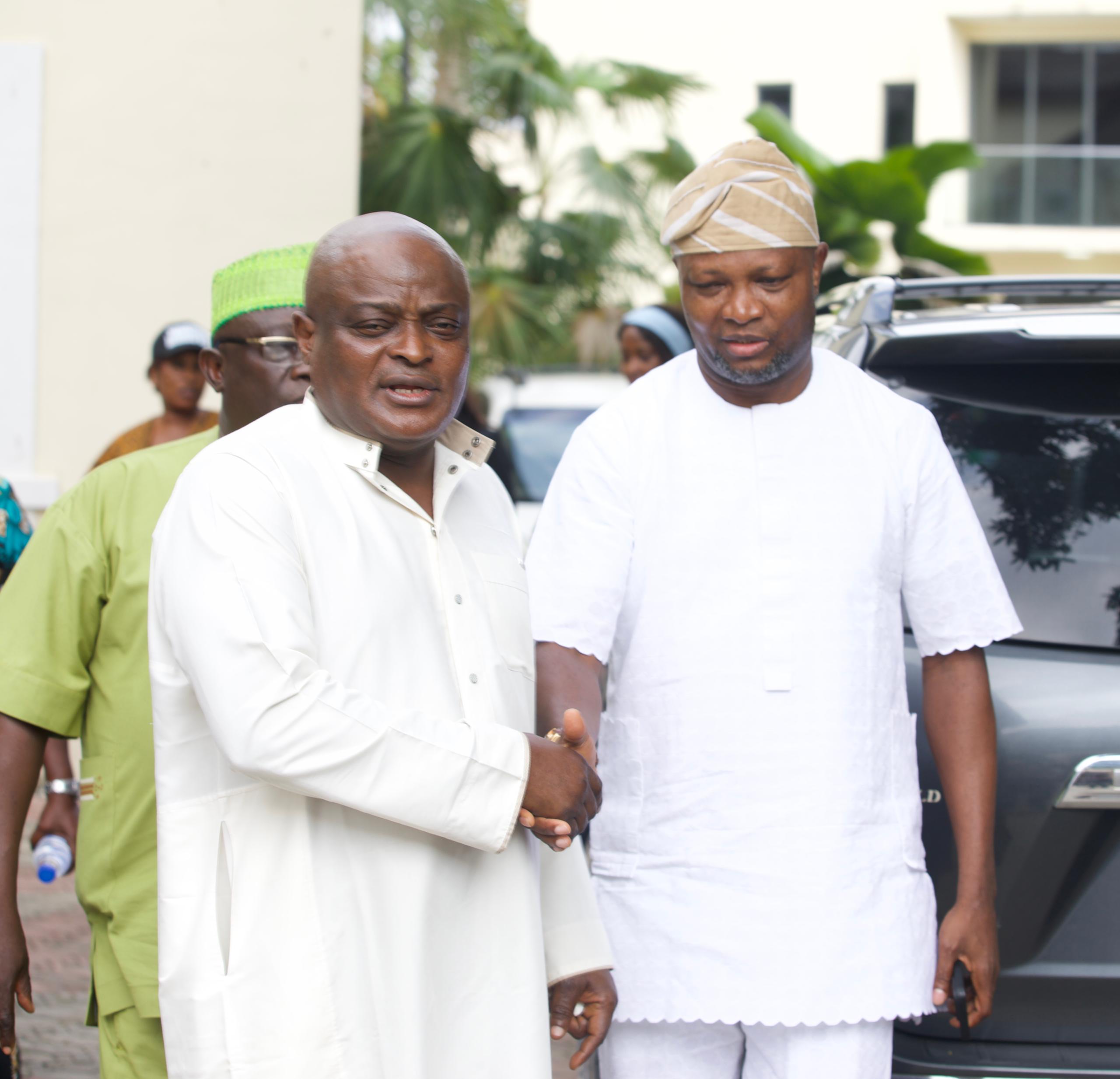In a significant step toward advancing his administration’s vision for Benue State, Governor Rev. Fr. Dr. Hyacinth Iormem Alia inaugurated 17 Commissioners on September 1, 2025, at the Old Banquet Hall of the Government House in Makurdi. The swearing-in ceremony marked a pivotal moment in the state’s governance, as the newly appointed officials were charged with upholding accountability, integrity, and transparency in their duties. Governor Alia, a Catholic priest and All Progressives Congress (APC) leader, emphasized the importance of collective effort in securing victory for the APC in the 2027 general elections while delivering people-centered governance to address Benue’s pressing challenges, including insecurity, poverty, and underdevelopment.
The Commissioners, a mix of eight reappointed officials and nine new appointees, were selected based on their expertise, governance experience, and commitment to the state’s development. Governor Alia also used the occasion to dispel rumors of a rift with his Deputy Governor, Sam Ode, affirming the administration’s unity and stability ahead of 2027. This article explores the details of the inauguration, the strategic significance of the appointments, the broader socio-political and economic context of Benue State, and the challenges and opportunities for achieving sustainable development. It also offers policy recommendations to ensure the Commissioners’ success in advancing Benue’s growth trajectory.
The Inauguration: A Call to Service
The swearing-in ceremony, held in the historic Old Banquet Hall, was a solemn yet optimistic event attended by government officials, APC leaders, traditional rulers, and community stakeholders. Governor Alia, known for his pastoral background and commitment to inclusive governance, set a high bar for the Commissioners, urging them to embody the principles of fairness, justice, and accountability as enshrined in Nigeria’s Constitution.
“You understand the vision and mission of this administration, which must be fully implemented,” Alia declared, emphasizing that the Commissioners’ roles extend beyond administrative duties to political leadership. He urged them to maintain open doors, engage directly with citizens, and serve as spokespersons for his administration’s achievements. “Tell the people what we are doing and how much is being spent by the government,” he said, highlighting the need for transparency in communicating the state’s progress.
The Governor’s charge was unequivocal: the Commissioners must prioritize the welfare of Benue’s citizens over personal interests, tackle insecurity head-on, and work tirelessly to secure an APC victory in 2027. “If you ever feel there is no money to give to the people, resign,” Alia stated, underscoring his expectation of selfless service. He emphasized that his administration is people-centered, not individual-focused, and called on the Commissioners to leave a lasting legacy through diligent and distinguished service.
The 17 Commissioners represent a blend of continuity and renewal. The eight reappointed Commissioners include:
Rev. Dr. Frederick Lanshima Ikyaan (Education and Knowledge Management)
Tiza Imojime (Works)
Dr. Yanmar Ortese (Health and Human Resources)
Ugwu Odoh (Water Resources)
Kwaghgba Amande (Digital Communications)
Aondowase Kunde (Disaster Management)
Michael Oglegba (Finance)
Alumo Orpin (Commerce, Trade and Investment)
The nine new Commissioners are:
Dennis Ter Iyaghigba
Ogwuche Ejeh Paul
Prof. Yangien Ornguga
Peter Obo Egbodo
James Dwem
Joseph Jir
Mrs. Margaret Adamu
Mrs. Theresa Odachi Ikwue
Benjamin Teryima Ashaver
Speaking on behalf of his colleagues, Hon. Dennis Iyaghigba expressed gratitude to Governor Alia for the appointments, pledging that the Commissioners would work collaboratively to justify the confidence placed in them. “We are committed to delivering results that align with your vision for a prosperous and secure Benue,” he said.
Strategic Significance of the Appointments
The inauguration of the 17 Commissioners is a strategic move by Governor Alia to strengthen his administration’s capacity to deliver on its promises while consolidating political support for the APC. The appointments reflect several key objectives:
Continuity and Expertise: The reappointment of eight Commissioners ensures continuity in critical sectors like education, health, finance, and infrastructure. These officials, having served in Alia’s first term, bring institutional knowledge and experience to sustain ongoing projects, such as school renovations and rural road rehabilitation.
Fresh Perspectives: The inclusion of nine new Commissioners introduces fresh ideas and energy, addressing emerging challenges like digital transformation and disaster management. The diversity of expertise, including Prof. Yangien Ornguga’s academic background, enhances the administration’s capacity to tackle complex issues.
Political Mobilization: Alia’s call for the Commissioners to work for an APC victory in 2027 underscores the political dimension of their roles. By appointing a mix of seasoned and new leaders, Alia aims to build a broad-based coalition to strengthen the APC’s position in Benue, a state with a history of political volatility.
Addressing Insecurity: The Governor’s emphasis on tackling insecurity reflects Benue’s status as a hotspot for farmer-herder clashes, banditry, and communal violence. Commissioners like Aondowase Kunde (Disaster Management) and Ugwu Odoh (Water Resources) are tasked with addressing the socio-economic factors driving conflict, such as land disputes and resource scarcity.
Grassroots Engagement: Alia’s directive to “spend time with your people” and maintain open doors signals a shift toward inclusive governance. This approach contrasts with previous administrations criticized for elitism and aims to rebuild public trust.
The Governor’s reaffirmation of Deputy Governor Sam Ode’s position also serves a strategic purpose. By dispelling rumors of a replacement, Alia projects unity and stability, countering potential opposition narratives ahead of 2027. This move strengthens the administration’s cohesion and signals to APC stakeholders that the leadership is united.
Benue’s Socio-Political and Economic Context
Benue State, known as the “Food Basket of the Nation,” is a critical agricultural hub in Nigeria’s Middle Belt, producing crops like yam, rice, and soybeans. However, the state faces significant challenges, including insecurity, poverty, and underdevelopment, which have shaped its governance and political landscape.
Insecurity: Benue has been a flashpoint for farmer-herder clashes, driven by competition over land and water resources. According to the International Crisis Group, over 2,000 lives were lost to such conflicts between 2018 and 2023, displacing thousands and disrupting agriculture. Banditry and kidnapping have also surged, particularly in areas like Guma, Logo, and Agatu. Governor Alia’s administration has prioritized security, with initiatives like the Benue State Civil Protection Guards and partnerships with federal security agencies to curb violence.
Economic Challenges: Benue’s economy is predominantly agrarian, but insecurity and poor infrastructure have constrained agricultural productivity. The state’s unemployment rate, estimated at 41% in 2024 by the National Bureau of Statistics, reflects the broader economic challenges facing Nigeria, including high inflation (over 30%) and naira depreciation. Alia’s government has launched programs like the Benue Agricultural Development Company to boost farming, but scaling these initiatives remains a priority.
Political Dynamics: Benue has a history of political volatility, with fierce competition between the APC and the People’s Democratic Party (PDP). Alia, elected in 2023, defeated the PDP’s Titus Uba, leveraging his reputation as a priest and community leader. However, tensions within the APC, particularly between Alia and his predecessor, Senator George Akume (now Secretary to the Government of the Federation), have fueled speculation about internal divisions. The inauguration of the Commissioners and Alia’s defense of Sam Ode aim to project unity and counter these narratives.
Socio-Economic Progress: Alia’s administration has made strides in education, healthcare, and infrastructure. Over 150 schools were renovated in 2024, and new primary health centers were established in rural areas. The government’s financial inclusion programs, such as partnerships with microfinance banks, have expanded credit access for SMEs. These efforts align with Alia’s “people-centered” vision, but sustaining them requires overcoming resource constraints and insecurity.
Implications for Benue’s Governance and Development
The inauguration of the 17 Commissioners has far-reaching implications for Benue’s governance and development:
Strengthened Administrative Capacity: The Commissioners’ expertise in sectors like education, health, and digital communications enhances the administration’s ability to implement its agenda. For instance, Rev. Dr. Frederick Ikyaan’s reappointment ensures continuity in education reforms, while Kwaghgba Amande’s role in digital communications supports Benue’s push for technological innovation.
Political Consolidation: The appointments signal Alia’s intent to build a strong APC coalition ahead of 2027. By blending reappointed and new Commissioners, Alia balances loyalty to existing allies with outreach to new constituencies, strengthening his political base.
Security and Stability: The emphasis on tackling insecurity positions the Commissioners as key players in addressing Benue’s most pressing challenge. Their success in implementing peacebuilding initiatives and supporting agricultural recovery will determine the state’s stability.
Grassroots Development: Alia’s call for grassroots engagement aligns with his administration’s focus on inclusive governance. Commissioners like Mrs. Margaret Adamu and Mrs. Theresa Odachi Ikwue, as female appointees, can champion gender-inclusive policies, addressing the needs of women and youth.
Public Trust: The directive to “tell the people what we are doing” underscores the importance of transparency in rebuilding public trust. By acting as spokespersons, the Commissioners can counter opposition narratives and highlight the administration’s achievements.
Challenges Facing the Commissioners
The Commissioners face several challenges in fulfilling their mandate:
Insecurity: Persistent farmer-herder clashes and banditry require innovative solutions beyond military operations, such as addressing land disputes and youth unemployment. Commissioners must coordinate with security agencies and communities to sustain peace.
Resource Constraints: Benue’s limited revenue, compounded by Nigeria’s economic challenges, restricts the government’s ability to fund projects. The Commissioners must prioritize cost-effective initiatives and explore partnerships with the private sector.
Political Pressures: The APC’s internal dynamics and competition with the PDP could create distractions. Commissioners must navigate these tensions while maintaining focus on governance.
Public Expectations: Benue’s citizens, grappling with poverty and displacement, have high expectations for tangible improvements. Delivering on promises in education, healthcare, and infrastructure is critical to maintaining public support.
Coordination and Accountability: As a diverse team, the Commissioners must work collaboratively to avoid silos and ensure accountability. Transparent reporting and regular performance evaluations are essential.
Opportunities for Impact
The inauguration presents significant opportunities for the Commissioners to drive Benue’s development:
Agricultural Transformation: As the “Food Basket of the Nation,” Benue can leverage its agricultural potential to boost food security and create jobs. Commissioners like Alumo Orpin (Commerce, Trade and Investment) can promote agribusiness and value chains.
Digital Innovation: Kwaghgba Amande’s role in digital communications offers opportunities to expand internet access and digital services, supporting SMEs and youth entrepreneurship.
Education and Health Reforms: Rev. Dr. Frederick Ikyaan and Dr. Yanmar Ortese can build on existing progress in education and healthcare, ensuring access to quality services in rural areas.
Peacebuilding: Commissioners like Aondowase Kunde can strengthen community-driven peace initiatives, engaging traditional leaders and youth to resolve conflicts.
Financial Inclusion: Partnerships with microfinance institutions and programs like the Benue Investment and Property Company can expand credit access, empowering women and SMEs.
Policy Recommendations
To maximize the Commissioners’ impact and advance Benue’s development, the following recommendations are proposed:
Strengthen Security Frameworks: Commissioners should collaborate with federal agencies and local communities to implement early warning systems and peace committees, addressing the root causes of insecurity.
Promote Agricultural Development: Invest in irrigation, mechanization, and agro-processing to boost productivity and create jobs. Partnerships with the federal government’s Anchor Borrowers’ Programme can support farmers.
Enhance Transparency: Establish a public reporting platform to communicate government spending and project progress, countering misinformation and building trust.
Expand Infrastructure: Prioritize rural road rehabilitation and electricity access to improve connectivity and support economic activity. Commissioners like Tiza Imojime (Works) can lead these efforts.
Support SMEs and Youth: Scale up microfinance and entrepreneurship programs to empower youth and women, reducing unemployment and fostering economic resilience.
Foster Inclusive Governance: Engage traditional and religious leaders in policy implementation to address ethno-religious sensitivities and promote unity.
Broader Implications for Nigeria
The inauguration of Benue’s Commissioners has implications beyond the state, given its strategic importance in Nigeria’s Middle Belt. As a key agricultural hub, Benue’s stability and productivity influence national food security and economic growth. The administration’s success in tackling insecurity and promoting development could serve as a model for other states in the northwest and north-central regions, where banditry and communal violence are rampant.
Politically, the appointments and Alia’s defense of Sam Ode signal a concerted effort to strengthen the APC’s position in Benue, a swing state with significant electoral weight. The administration’s performance will shape voter sentiment ahead of 2027, potentially influencing national politics. Alia’s emphasis on transparency and grassroots engagement also aligns with broader calls for accountability in Nigeria’s governance.
Economically, Benue’s progress can contribute to Nigeria’s diversification efforts, reducing reliance on oil by strengthening agriculture and SMEs. The Commissioners’ ability to deliver results in critical sectors will determine the state’s contribution to national GDP and poverty reduction.
Looking Ahead: A Vision for Benue
The inauguration of the 17 Commissioners marks a new chapter in Benue’s journey toward prosperity and stability. Governor Alia’s charge to uphold accountability, engage with citizens, and tackle insecurity sets a high standard for leadership. By blending experienced and new appointees, the administration is well-positioned to build on its achievements and address Benue’s challenges.
However, the road ahead is fraught with obstacles, from insecurity to economic constraints. The Commissioners must work collaboratively, leveraging their expertise to deliver tangible results in education, health, agriculture, and infrastructure. By fostering inclusive governance and transparency, they can rebuild public trust and counter opposition narratives.
As Governor Alia stated, “This administration is people-centered, not individual-focused.” With a commitment to this vision, the Commissioners can leave a lasting legacy, transforming Benue into a beacon of development and stability in Nigeria’s Middle Belt. The success of this team will not only shape Benue’s future but also contribute to Nigeria’s broader aspirations for peace, prosperity, and inclusive growth.








